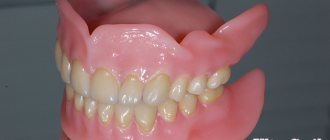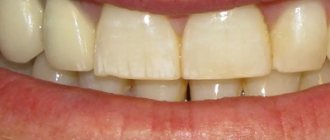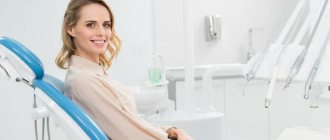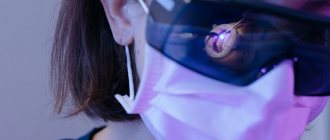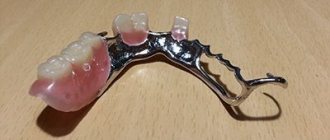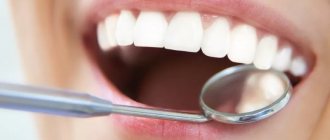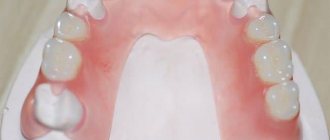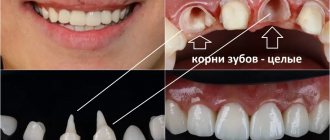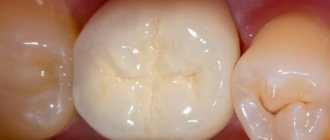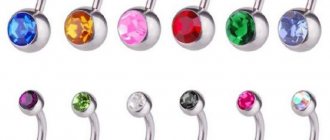About 50% of those who use removable dentures in everyday life indicate that the main problem in their use is insufficient strength of fixation in the oral cavity. This feature is the reason that when performing certain actions (eating, talking, laughing), the prosthesis can noticeably shift relative to its normal position.
To avoid such troubles, it is recommended to use special means that ensure high-quality fixation of dentures in the oral cavity.
Typically, when it comes to nylon and acrylic dentures, creams and gels are used. Gels are not inferior to creams in their functionality and differ from them only in consistency. Creams have a denser structure and are better suited for those who are just starting to use removable dentures.
Below we will consider the main means that are used for reliable and long-term fixation of dentures, their advantages and disadvantages.
How to quickly get used to removable dentures
Naturally, each person is individual, and the duration of adaptation directly depends on the model and materials of construction. Conventionally, the process of addiction can be divided into three stages:
- irritation stage, which lasts about 7-10 days,
- stage of conditioned inhibition (duration – 3 weeks),
- the stage of full adaptation, when the patient completely gets used to the new artificial teeth (occurs after 30-40 days).
Immediately after installation, removable dentures may cause you nausea, increased salivation, changes or complete loss of taste, and difficulty eating. Diction problems also occur. But as you get used to the design, all manifestations disappear completely or are reduced to a minimum.
“Of course, there are patients who cannot get used to any removable dentures, even if they are made perfectly and in exact accordance with the bite. For example, with an increased gag reflex or if there is initially no psychological mood. In such situations, you need to look for alternatives and the best solution is prosthetics on implants, which is hundreds of times more comfortable and does not cause such unpleasant sensations.”
Chorny Stanislav Vladimirovich, orthopedic dentist, work experience more than 16 years
Can't get used to removable dentures? Dental implantation will solve all your problems. In 1 day and forever. Lifetime guarantee on doctors' work.
Free consultation
During the period of getting used to the prosthesis, you need to wear it constantly, without removing it while eating and sleeping. You should not use it in case of acute pain - it is better to consult a doctor to correct the design.
It is important to understand that any removable denture, especially if it is installed for the first time, will require regular correction. The gums sag along with the bone tissue, the position of the joint changes, the bite is adjusted - all this will lead to the fact that the prosthesis will seem uncomfortable. One visit to the doctor and the position of the device will change - you will become more comfortable. Remember this and do not ignore your doctor's recommendations.
How to store dentures correctly -
In this section we will tell you how to store dentures at home. Most often, patients do not know how to store dentures correctly, because removable dentures must almost always be removed at night. Keep in mind that improper storage can quickly lead to deformation of the prosthesis.
Soak the dentures overnight - for the first two weeks after making the denture, dentists recommend wearing the new denture almost all the time, without removing it, or removing it for a short period of time.
However, after two weeks, the tissues of the prosthetic bed need regular rest - at least 6 hours a day. Remember that most types of dentures must be kept moist to maintain their shape. When removing them for a long period, you need to place them in a solution of water or a special solution for soaking dentures (you can buy it at the pharmacy). Place the denture in water overnight. Do not keep dentures with metal elements in water that smells like chlorine - this may cause the metal parts of the denture to darken.
Important: remember that dentures can become deformed due to the following two reasons... Firstly, if the dentures dry out, and secondly, if you place them in hot water. After this, the shape of the denture will no longer fit the shape of your gums, and the denture will cause pain and discomfort when wearing or eating.
How to whiten dentures –
Denture whitening may be necessary if you have not taken good care of your removable dentures for a long time, which has led to their darkening (due to the attachment of pigment plaque and tartar). Whitening dentures using whitening toothpastes is highly not recommended, because... Such toothpastes have increased abrasiveness.
Remember that the surface of the denture is much less hard (than tooth enamel) and as a result is more susceptible to abrasion and scratches. Therefore, the use of whitening pastes will quickly cause irreparable damage to the prosthesis. The best means for whitening old dentures are an ultrasonic bath, an option using De'Longhi EcoDecalk liquid, and, again, Corega effervescent tablets. We hope that our article on the topic: How to store and care for removable dentures was useful to you!
Sources:
1. Personal experience as a dentist, 2. “Orthopedic dentistry. Textbook" (Trezubov V.N.), 3. "Removable dentures: a textbook" (Mironova M.L.).
How to restore diction
To restore diction, it is recommended to speak as much as possible: read books, pronounce tongue twisters, while holding one or more sweets in your mouth (without sugar! For example, Sula with mint or sea buckthorn).
15-20 minutes, several times a day. The duration of the course is the first 1.5-2 weeks after prosthetics. Tongue twisters for restoring diction after removable prosthetics
| For your convenience, we have selected several useful tongue twisters |
| The snout pig was white-nosed, blunt-nosed; I dug up half the yard with my snout, dug, dug. |
| Karl stole Klara's advertising, and Klara stole Karl's budget. |
| In Kabardino-Balkaria, valocordin from Bulgaria. |
| The fast talker quickly said quickly, That you can’t quickly talk all the tongue twisters, but you can’t over-speak all the tongue twisters, But, having quickly spoken, he quickly said, That you can’t talk all the tongue twisters, but you can’t over-speak. |
Why does food accumulate on dentures?
With every meal, food particles remain on the prosthesis, and this happens for several reasons:
- Food that falls to the floor of the mouth can become lodged under the lower jaw denture.
- Small pieces of food that move in different directions in the mouth during chewing and swallowing can get into the space between the palate and the upper denture.
- Food sticks to the rough surface of dentures much more easily than to the soft tissues of the oral cavity; Over time, food debris accumulates on artificial teeth.
Dentures take up quite a lot of space in the mouth, and their owners feel the presence of food debris under the denture much better than people with natural teeth, between which food particles can also remain.
What hygiene products can be used
Hygiene products for the care of removable dentures
| Name | Description |
| Toothbrush | You will need a personal brush with soft bristles; too hard can lead to scratches in which bacteria will accumulate. We recommend the Curaprox brand – brushes with soft or ultra-soft bristles. They do not damage the plastic, but do an excellent job of removing plaque on the teeth, also cleaning it from under the gums. |
| Toothpaste | Low-grade, for example, Parodontax, ROCS To clean the prosthesis itself, you can also use children's paste - it is more gentle. |
| Irrigator | The device is necessary both for cleaning your own teeth, if they remain in the mouth, and for cleaning dentures - it effectively removes plaque and allows you to clean the interdental spaces very efficiently. |
| Citric acid and soda or tablets for cleaning and disinfection | Use for periodic cleaning and disinfection of structures - make solutions for rinsing the mouth or place dentures in them (applies to citric acid and soda). The tablets must be dissolved in water and the resulting solution must be used to soak the structure. |
Requirements for cleaning products for orthopedic structures
A product for cleaning artificial crowns and gums must meet the following requirements:
- Efficiency. It is important that the product helps quickly remove all food debris from open and hard-to-reach areas.
- Safety. The composition should not contain toxic substances, foaming agents, or abrasive particles.
- Comfort of use. Good pasta has a pleasant or neutral taste.
Besides these, there are other requirements. For example, paste for dentures should not scratch their surfaces or change color. It is also desirable that after using it, a feeling of freshness appears in the mouth, and all unpleasant odors disappear.
What to do if the prosthesis rubs and does not fit well
- use ointments (Solcoseryl, Metrogyl Denta) or sea buckthorn oil. Apply the oil to the gums for a maximum of 20 minutes after eating and cleaning the denture 3-4 times a day,
- It is forbidden to sharpen dentures yourself, after which you can simply throw it away,
- If there is acute and constant pain caused by rubbing of the structure, you should consult a doctor for correction. 2-3 hours before the visit, the denture should be in the mouth so that the reason why the structure is rubbing becomes visible.
If the device is not fastened well, then you should contact your attending physician - an orthopedic dentist. If the correction does not help, you will have to use special fixation creams: Protefix, Corega, Lacalut Dent. Choose the one that suits you - according to taste, consistency, fixation time. Try different options and choose the best one.
Features of wearing removable dentures
Removable dentures have some features. When designing removable dentures, it is impossible to take into account several factors that can only appear while wearing the dentures. This is the degree of pressure of the prosthesis on the gum and the degree of fixation of the prosthesis. It happens that at first patients are concerned about pain when wearing dentures.
Correction of removable dentures
Correction of removable dentures - grinding of the structure in places of contact with the oral mucosa - is carried out the next day after installation of the denture. During the first two weeks of wearing the structure, several adjustments to the prosthesis may be required.
The correction procedure is carried out in the dental office by the attending dentist. Before visiting a doctor to have your denture adjusted, be sure to wear it and walk around with it for at least three to four hours. Also, do not carry out self-correction of a removable denture using improvised tools. At best, this will completely disrupt the fixation of the prosthesis, and at worst, it will lead to a breakdown, after which it is impossible to restore the structure - you will have to make a new one.
If the denture rubs the gum
Some patients, when wearing dentures for the first time, complain that the structure rubs their gums. This is the result of the oral cavity “getting used to” a foreign object. In order to get rid of unpleasant sensations, consult a doctor - he will correct the prosthesis. Don't tolerate discomfort. In the place where the prosthesis rubs, an inflammatory process can form, and healing due to constant friction is almost impossible. If you cannot get to the orthopedist who installed the prosthesis for you, you can turn to us for a service - at the clinic on Shchelkovskaya. An experienced specialist will see you and help you adjust the prosthesis so that nothing bothers you. Just call 8 (495) 033-00-63 or leave your details in the registration form on our website.
Fixation of the prosthesis
The anatomical features of the jaw structure in some people create obstacles to comfortable wearing of dentures. In such cases, you can use a special fixing gel, which is applied in a thin line to the prosthesis. This gel is completely invisible to humans and is absolutely safe. It is better to choose a gel in consultation with your doctor.
Broken prosthesis
During the use of prostheses, due to various factors, the prosthesis may break, as well as cracks and chips. In such cases, you must immediately consult a doctor to repair the structure. The repair period for a prosthesis is up to three days; making a new design (if the old one cannot be corrected) takes a week.
How to eat after installing structures
If the prosthesis is made of comfortable materials, if it suits you, then you will be able to eat well right away. Restrictions occur when little time has passed after the removal of living teeth, when you initially had gum inflammation. In such situations, pressure causes pain; you need to limit the chewing load to avoid discomfort and allow the gums to recover.
In general, during adaptation it is advisable to adhere to the following recommendations:
- give preference to soft and warm foods, exclude viscous foods,
- you need to chew carefully and thoroughly, cut food into small pieces,
- It is better to chew food on the side where the process does not cause pain,
- You should refrain from biting food with your front teeth.
After adaptation, when the prosthesis no longer causes pain, you can return to your usual diet. But you should exclude foods that are too hard, viscous, sticky, excessively hot and cold (drinks and soups should be warm, ice cream should be kept a little at room temperature).
Comments
My financial situation is quite tense; I can’t afford to buy pills every time. What else and how can you clean dentures at home? Maybe there are some safe folk methods?
Galina Semenovna (09.25.2019 at 19:00) Reply to comment
- Dear Galina Semyonovna! You should be extremely careful with traditional methods, because... they can cause harm: spoil the outer covering of the prosthesis, deform it, and contribute to the appearance of cracks and scratches. You cannot use soda, alcohol, and especially white. Avoid using potassium permanganate and salt. You can try dissolving a teaspoon of citric acid in a glass of warm water and immerse the denture in it to clean it (but leave it for no more than 5 minutes) - this method can sometimes be used, but not on a permanent basis. In general, it is better to consult your doctor about the advisability of using such methods.
Editorial staff of the portal UltraSmile.ru (09.29.2019 at 09:14) Reply to comment
I have clasp dentures, I always used tablets for them, but then we went to a friend’s dacha and forgot to take them with us. She had chlorine tablets there and offered them. They say they disinfect and clean well, but I was afraid. Can they be used?
Olga Yuryevna (10/12/2019 at 15:44) Reply to comment
- Dear Olga Yurievna. For any prosthetics, the use of chlorine is unacceptable, because... Although chlorine cleanses, it acts very aggressively; in addition, it will negatively affect the oral mucosa, cause allergies and irritation, and it will be very difficult to thoroughly rinse the denture after it. As for clasp dentures containing metal elements, the use of chlorine is harmful for them, because the metal will darken under the influence of this substance.
Editorial staff of the portal UltraSmile.ru (10/22/2019 at 09:24) Reply to comment
Tell me, what is the best product to choose for cleaning my grandfather’s removable dentures? We've heard that there are special tablets for cleaning dentures, but I have no idea how effective they are!
Karina (10/14/2019 at 07:44 pm) Reply to comment
Tell me, can tablets for cleaning dentures cause an allergic reaction? After all, their particles can remain on the dentures themselves, causing irritation in the oral cavity or am I mistaken?
Luda (10/14/2019 at 07:47 pm) Reply to comment
Tablets for cleaning removable dentures are the best solution, because it is not very convenient to constantly clean them manually. How to properly use such tablets to clean dentures and how often?
Etella (10/14/2019 at 09:17 pm) Reply to comment
An elderly person has removable dentures, and sometimes there is a problem with cleaning them. I read about special tablets for cleaning dentures. How should they be used?
Felix (10/14/2019 at 09:19 pm) Reply to comment
In the near future I plan to put on dentures; at the consultation, the doctor said that the best cleansing agent is tablets for cleaning dentures, but I am terribly allergic. Please tell me, is this method of cleansing suitable for me? Perhaps there are some tablets for allergy sufferers, with a gentle composition, for example?
Elena (01.11.2019 at 13:32) Reply to comment
How to use tablets for cleaning dentures correctly, are the weight of the tablets suitable for this, where is the best place to order them? I heard that this method of cleaning dentures is more effective.
Tonia F (11/01/2019 at 10:08 pm) Reply to comment
How to properly use tablets to clean dentures, are all tablets suitable for this and where is the best place to order them? I heard that this method of cleaning dentures is more effective.
Tonia F (11/01/2019 at 10:10 pm) Reply to comment
I’m looking at tablets for cleaning LACALUT Dent dentures. Could these tablets not be suitable for allergy sufferers? And if so, what alternative options can I choose?
Anastasia (11.11.2019 at 17:12) Reply to comment
I had no idea that there were so many different types of denture cleansing tablets. My relative only uses tablets for cleansing, are there any other cleansing options needed for comprehensive cleansing or are tablets alone enough?
Veronica (11.11.2019 at 20:30) Reply to comment
I bought tablets to clean dentures and did everything according to the instructions. The tablet dissolved, but there was a small sediment left at the bottom. Does this mean that the quality of the tablets leaves much to be desired?
Natalya Valerievna (11.11.2019 at 20:32) Reply to comment
I have only recently been using a prosthesis. I was very afraid because I didn’t know about such easy ways to clean dentures and was worried that I wouldn’t be able to clean the denture myself. My daughter recommended the pills and together we figured out how to use them. Very good item, no smell or residue. The only question is: is it harmful for the prosthesis if you add more tablets than necessary?
Vasilisa Arkadyevna (11/27/2019 at 6:07 pm) Reply to comment
My grandmother has dentures. I don't even know how she cleans them. And, to be honest, I never thought about it. She needs to be advised to take tablets to clean her dentures. Of course, I heard advertising about Corega. Which of these do you think should I buy so that the price matches the quality!?
Maria (11/28/2019 at 08:36) Reply to comment
My grandmother has acrylic dentures. This is the second year with them. It was hard to get used to. My gums also hurt, and I couldn’t eat at all. But gradually I got used to it. For fixation, I now buy her Mostaden Twins Tech cream. Excellent fixation and long lasting. Prevents food particles from getting under it.
Natalya (01/19/2021 at 04:26 pm) Reply to comment
Write your comment Cancel reply
How to clean dentures and remaining teeth
You need to brush your teeth exactly as you are used to: in the morning, in the evening and after every meal. But as for prosthetics, the recommendations will be as follows:
Daily care
- clean the structure in the morning and evening with a soft toothbrush using toothpaste without abrasives or regular soap (preferably baby soap). Pay special attention to the internal area that is in contact with the gum,
- Soak the denture daily in a solution of citric acid (1 teaspoon per 150 ml of warm water): soak it for 10 minutes to disinfect and loosen plaque. Carry out the procedure before brushing your teeth 2 times a day. Afterwards, rinse thoroughly with water. Change the solution every 3-5 days,
- after each meal, the structure is removed and thoroughly rinsed under running water,
- Additionally, you can use an irrigator, which will clean the microscopic gaps between the crowns of the structure,
- Be careful when brushing your teeth, especially if there are small parts - hooks, clasps, so as not to damage them.
Periodic care
- soak in a disinfectant solution - for this you need to purchase special tablets for removable dentures (Protefix, Corega, Lacalut Dent). Use up to 3 times a week while maintaining daily hygiene. Use according to instructions (keep in solution for 15-20 minutes),
- use products that suppress the activity of oral microflora (especially important several years after the installation of dentures, since more plaque accumulates on them). For example, “Tantum Verde” (spray, lozenges) - relieve inflammation and tension, freshen breath.
Modern equipment - ultrasonic sterilizers - can be used to disinfect dentures. They allow you to achieve ideal cleanliness of artificial teeth at home, cleaning them from bacteria and plaque. These devices can also be used to disinfect any other items - toothbrushes, baby bottles, etc.
Nuances of choosing paste for dentures
The choice of hygiene product for orthopedic structures depends primarily on the type of prosthesis:
- Artificial crowns and fixed bridges can be cleaned with conventional non-bleaching toothpastes with an abrasiveness index (RDA) of less than 50.
- It is better to clean removable dentures from food debris and bacterial plaque with special pastes that do not contain abrasive particles at all, so conventional products are not suitable.
- Structures of any type cannot be cleaned with tooth powder, which is intended for much harder natural enamel.
Manufacturers today offer a wide selection of special pastes for dentures. Such products do not contain components that can scratch the structure or leave stains on it or change color. But if you don’t have such a paste on hand, you can clean the denture with soap. In this case, the structure must first be removed and thoroughly rinsed with water after hygienic treatment.
Do I need to remove dentures at night?
Modern “removers” can be worn constantly and it is not necessary to remove them at night – especially during the first 2-3 weeks, while adaptation to the designs occurs. However, outside the oral cavity, dentures with a plastic base should NOT be placed in a humid environment, since favorable conditions are created for the development and growth of pathogenic microflora. This can lead to bleeding and gum inflammation.
If there are metal elements, the prosthesis must also not be stored in tap water, especially chlorinated water - this can lead to metal corrosion.
For storage and transportation, it is necessary to use specially designed protective ventilated boxes/cases in which the prosthesis will be kept clean and dry.
Give up removable dentures forever! Consultation + diagnosis + treatment plan FREE. Find out which dental implantation method is right for you in 1 day!
Enroll now
Service life of removable dentures
If you follow the rules and provide regular care for your removable dentures, the design will last you a long time. The minimum service life of prostheses is three years. The production of new prostheses after a certain period of time is extremely necessary - wearing outdated structures causes bone tissue atrophy and “sagging” of the lower part of the face.
When wearing removable dentures, it is important to visit a dentist at least twice a year. The doctor relines the prosthesis - restoring a tight fit of the prosthesis to the jaw. The doctor also examines the general condition of the oral cavity, which allows timely detection and treatment of inflammatory processes.
If you feel severe discomfort while wearing removable dentures, dry mouth, pain, then contact your dentist as soon as possible - he will help identify the causes of symptoms and carry out the necessary restorative procedures.
Is it possible to whiten dentures?
If hygiene is insufficient, dentures may change their shade. But, unfortunately, it is impossible to bleach it to its original state, especially if a lot of plaque has accumulated and the coloring pigments have penetrated deep into the pores of the material. The doctor can perform polishing - the prosthesis will be smoother, its top layer will be a little ground off, so the structure will be visually lighter. At home, you can try using special whitening tablets (for example, Corega), but you should not overuse them - they can damage the prosthesis materials.
How not to make a mistake with your choice
If you have installed dentures and still don’t know how best to clean them, you can seek advice from your doctor. He will help you choose the product that will be most effective for you. However, it is not always possible to choose your ideal option the first time, and you have to use the trial method. However, when choosing, you should definitely take into account contraindications for use and possible side effects. Sometimes it happens that in some patients tablets of one brand cause allergies and individual intolerance, while in others they do not.
“Before I met Protefix, I always gave preference to Corega - I used all care products only from this brand. It was so convenient and it seemed that it was very correct, because... All products from the same series complement each other. But Protefix won me over the first time - it seemed to me that the results from their use were better, because They were able to remove a stain that the cores couldn’t handle at all.”
Tamara Vitalievna, review from the dental portal gidpozubam.ru
How to know when it’s time to change your dentures
It is recommended to change dentures every 3-5 years or 5-7 years (depending on the material and type of construction).
When using removable dentures, the load from chewing food on bone tissue is only insignificant, which is fraught with its gradual resorption. The jawbone decreases in size, and not always evenly. This process takes from six months to several years and leads to a discrepancy between the shape of the prosthesis and the relief of the gums - the prosthesis is less secure and becomes less stable. This means relocation (if possible) or complete replacement of the structure is required.
In addition, materials wear out over time under the influence of saliva, nicotine, food irritants, and mechanical stress. Cracks appear on the structure, the surface becomes less smooth, which contributes to the accumulation of a large amount of plaque. If you have chosen crowns made of plastic (namely, they are in most cases used in removable orthopedic devices), it is worth considering that they wear down quite quickly, so after about 2-3 years the bite changes, which can affect the condition of the joint and the process of normal chewing food.
Fixing spacers
This remedy is most often used during the first weeks of wearing a prosthetic structure. Accustoming to a foreign product in the oral cavity occurs differently in different patients. Some experience increased salivation, while others experience discomfort and problems chewing food. Products made of soft fibrous fabric allow you to very carefully fix the prosthesis on the gum. At the same time, they attach well, do not change the bite and protect the gum tissue from rubbing or pressure from the prosthesis. Before applying the fixing gasket, it should be immersed in warm water to wet it. As soon as the product is saturated with water, it can be placed on the inner surface of the prosthesis.
The main indications for using a fixing gasket are:
- significant deformation of the gums as a result of prolonged absence of teeth;
- individual features of the jaw structure;
- atrophic changes in the bone tissue of the upper or lower jaws.
Experts recommend changing retaining pads daily and not neglecting the rules of oral hygiene. It is necessary to regularly clean both the gums and teeth, and the prosthetic device itself. Otherwise, if there are food residues or oil stains on the base of the prosthesis, the gasket will not be fully fixed.
Patients who use this type of prosthesis fixation recognize its obvious advantages:
- protection of the gums from contact with polymer materials of the prosthesis;
- long-lasting and high-quality fixation for 8 hours;
- absence of allergic reactions and irritation of gum tissue;
- effective correction of tissue adhesion during gum deformation;
- antiseptic and aromatic additional effect.
What happens if you don’t take care of your dentures?
Poor care of removable dentures can lead to loss of appearance of the structures and also cause health problems. The most common consequences include:
- color change, loss of shine of the structure;
- ulcers on the oral mucosa;
- change in taste sensations;
- caries of natural teeth;
- bad breath;
- bleeding gums;
- periodontitis;
- stomatitis.
Therefore, check with your doctor in advance for details on care and hygiene. Follow the rules for wearing removable dentures, and the adaptation period will pass without consequences.
What to exclude from your diet
After installation of dentures, you will have to adjust your diet. Some foods will have to be abandoned forever, others only temporarily. The adaptation period will take several weeks. At this time, dentists recommend giving preference to soft and liquid foods.
If the patient has not previously worn dentures, he can begin adaptation with nutritional fluids, such as baby formula, fruit and vegetable juices, and chicken broth. Later, include puree soup, soufflé, puddings, mousses, porridge from finely ground cereals and mashed potatoes into the diet. You can also drink tea, coffee, strained compote, still mineral water and milk. For sweets, honey or jam without berry seeds is allowed.
Gradually, you can switch to soft foods and supplement your diet with boiled side dishes (potatoes, rice and pasta), eggs and unsweetened baked goods, which should be soaked before use. You can add dairy products: soft cheese, ricotta or cottage cheese.
After the adaptation period is completed, you can eat coarser and tougher foods, for example, pearl barley or buckwheat porridge. In this case, fruits, vegetables and meat need to be cut into small pieces.
There are foods that will have to be excluded from the diet forever. These include especially hard and sticky foods: nuts, cereals, croutons, chewing gum, toffees, caramel, chocolate and peanut butter.
It is also better to avoid strawberries, raspberries, blackberries, grapes with seeds, and baked goods with sesame seeds or poppy seeds. All of these products contain small seeds that can easily get stuck between dentures and gums.
When eating, try not to use your front teeth, as this may cause the dentures to move. Chew food on both sides of your mouth so that the load is evenly distributed on your teeth and your gums become accustomed to the pressure from the dentures. Chew your food slowly and thoroughly before swallowing.
Problems associated with food residues on dentures
Some parts of your dentures tend to have more food stick to them than others, and if you don't clean them regularly, a variety of dental problems can arise. According to researchers, 54.8% of patients with removable dentures complain of bad breath. Food debris accumulated in the oral cavity is consumed by bacteria, which release unpleasant-smelling substances. To find out if halitosis is caused by your denture, place it in an airtight plastic food container for five minutes. Once you open the container, you will immediately understand whether the bad breath is related to the denture or not.
Another common complication is inflammation of the soft tissues of the oral cavity. When food particles accumulate on a particular area of the denture that is in contact with the mucosa, bacteria that feed on these food debris can attach to the oral tissue and cause an infection. The resulting inflammation can lead to the development of periodontitis or pathological changes in the tissues of the oral cavity associated with denture stomatitis, which may also lead to the appearance of erosions in the corners of the lips.
Numerous studies, scientists explain, have demonstrated the connection between poor dental status and severe systemic diseases such as diabetes, coronary heart disease and rheumatism. This is why it is so important to know how to properly and effectively clean a denture, regardless of its design.
